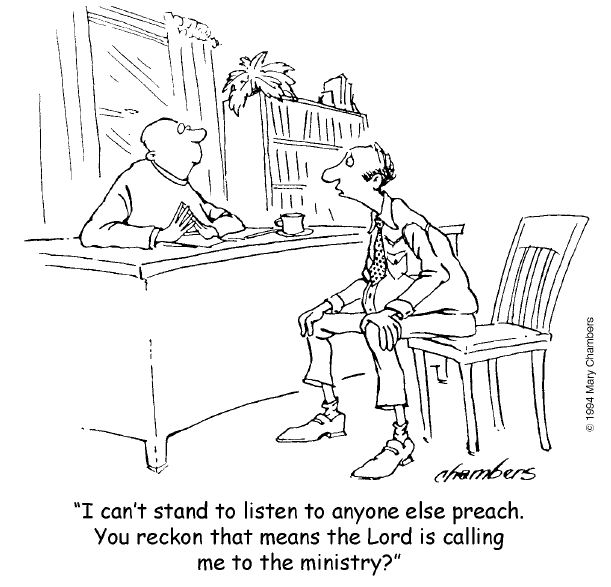Dear Brothers and Sisters in Christ,
 As we begin a new year, I want to focus on the calling that is shared by pastors. As shown below, many people have no idea what pastors do. And it’s not unusual for pastors to feel inadequate in their role. I’ve felt that way too, as apparently did Paul in asking, “who is equal to such a task?” He then noted (speaking of himself as a vessel) that, “we have this treasure in jars of clay to show that this all-surpassing power is from God and not from us” (2 Corinthians 2:16, 4:7). Despite the times of doubt that pastors sometimes face, they find reassurance in remembering that God has called them and that they have his anointing to serve him in this way—an anointing confirmed by their ordination.
As we begin a new year, I want to focus on the calling that is shared by pastors. As shown below, many people have no idea what pastors do. And it’s not unusual for pastors to feel inadequate in their role. I’ve felt that way too, as apparently did Paul in asking, “who is equal to such a task?” He then noted (speaking of himself as a vessel) that, “we have this treasure in jars of clay to show that this all-surpassing power is from God and not from us” (2 Corinthians 2:16, 4:7). Despite the times of doubt that pastors sometimes face, they find reassurance in remembering that God has called them and that they have his anointing to serve him in this way—an anointing confirmed by their ordination.

I am pleased that our elders approach their calling to pastoral ministry with humility and faith—an attitude refreshingly different than the one displayed by the guy in the cartoon at right. Sadly, some people become pastors to “do their own thing.” But Paul tells us that pastors, along with other ordained ministers are called “to equip God’s people for works of service, so that the body of Christ may be built up until we all reach unity in the faith and in the knowledge of the Son of God and become mature, attaining to the whole measure of the fullness of Christ” (Ephesians 4:11-13, TNIV).
All Christians are called to share in the ministry of Jesus, through what Paul refers to here as “works of service.” Ordained ministers, including pastors, are called to serve by equipping and then leading God’s people in these works.
To be called by God to serve as a pastor is a privilege, blessing and responsibility. It’s a calling that comes to different people in different ways—sometimes quietly, over a long period of time; at other times dramatically and suddenly—like Paul on the road to Damascus (Acts 26:12-14).
I have been asked, “How do I know ‘for sure’ that I am called to be a pastor?” The hard answer is that you will know “for sure” only in your spirit and through the confirmation of those you serve. We walk by faith, not by sight and the opportunity to serve God is unlike any other life endeavor. The center of that service involves feeding others through sharing with them the Living and Written Word of God. The aim of that service flows out of a desire that others come to know God through Jesus Christ and put their trust in him alone for life now and eternally.
Signs that point to such a calling are love for studying and communicating the Word of God, desire to pray with and for people, desire to enable people to come to God in worship, and desire to help people become a fellowship of those gathered in the Holy Spirit around the Word of God both Written and Living.
Pastoral service brings with it the power of God moving through us in humility. And though that brings us joy, it can also bring disappointment. None of us are perfect and neither are the ones we interact with in ministry. And sometimes God’s leading is simply mysterious, beyond our comprehension.
Whether we are rich or poor, learned or uneducated, or anywhere in between, God has a job for us and he calls us to it. We must not confuse the form of that call with the substance of it. Since God is invisible, it is his nature to call us by dropping hints. Many have told me that they eventually realized that God was dropping such hints in their life for years, though they did not notice them right away. We humans can be rather dense at times. But when we look back on our lives and pray about God’s will, the little hints he has placed in our lives are recognized as our call to pastoral ministry.
There are numerous ways we experience such affirmation. You might feel that you have fallen into this role because no one else was stepping up. But this may be a sign that God wants you to join others in his service. Some of us have been serving in pastoral ministry for a number of years without perhaps even recognizing it ourselves. But others have seen the fruits of your service, and this could be God’s affirmation. If you have been asked by others to serve in a pastoral leadership role then this leadership activity may also be a call on your heart to serve.
Pastoral ministry, regardless of the specific area of service, is extremely challenging. The stress level can be significant, rated by some to be second only to medical doctors. To function properly as a pastor requires that we resist the pull of our fallen human nature and maintain humility before God. We are all called to be his servant, using the gifts he has given us to direct others to him. As we let our Lord serve us, we must then grow in our ability to shepherd and serve others. For that reason, GCI in the United States requires that its senior pastors participate in the Pastoral Continuing Education Program.
Some pastors fulfill the continuing education requirement by pursuing a master’s degree at Grace Communion Seminary. Because it is accredited, not all pastors are eligible to enter GCS.
Accreditation is vital for the future of our denomination, as we seek to help more and more of our pastors meet high professional standards, including advanced education. Also, earning a GCS degree takes considerable time, finances and other resources. If you are able to pursue a degree at GCS, or simply want to take a few classes there, I urge you to do so. Registration for the upcoming spring semester is now open—see details in the “GCS registration now open” article linked at left.
Because many of our pastors cannot pursue a GCS degree, we offer other continuing education options, including classes at Ambassador College of Christian Ministry (http://www.ambascol.org/). Also, I’m pleased to announce that GCS now offers several non-credit classes that are available online to anyone at no cost. You’ll find them at http://www.gcs.edu/course/view.php?id=32.
Let me once again say thank you for the good work that you do. It is a wonderful encouragement to me to know you, fellowship with you, hear your stories and see what God is doing through us together.
Sincerely, in Christ’s service,
Joseph Tkach
 P.S. The first edition of the new online Christian Odyssey magazine in now posted at christianodyssey.org. Electronic publishing is the next step for magazines, as the cost of printing and mailing continues to increase. However, we understand that transitioning from a printed magazine to an online format presents challenges. Therefore, we would appreciate your feedback. For example:
P.S. The first edition of the new online Christian Odyssey magazine in now posted at christianodyssey.org. Electronic publishing is the next step for magazines, as the cost of printing and mailing continues to increase. However, we understand that transitioning from a printed magazine to an online format presents challenges. Therefore, we would appreciate your feedback. For example:
- Is the new site easy to navigate?
- Is it clear how those who prefer a printed copy can obtain one?
- Has anyone from your congregation asked you to provide them a printed copy?
We continue to make updates and changes to the Christian Odyssey site on a regular basis and look forward to adding new features soon. Please email john.halford@gci.org with any ideas, thoughts or comments that will help us make this transition as positive and effective as possible.



Thanks Joe,
Encouraging and uplifting letter!
Curtis
As a GCI ministry developer and GCS instructor, it my joy to know many GCI pastors and my privilege to take part in equipping them for ministry with Jesus. Our Trinitarian, incarnational theology is a wonderful gift that helps us accurately discern what Jesus is doing and actively “dive in” to share, through the Spirit, in Jesus’ ongoing ministry. Thanks Joe for your leadership and encouragement.
As a recent graduate from ACCM I can wholeheartedly agree on the quality and depth of this study program. It has proven to be a great help for us lay people to better serve our local congregation.